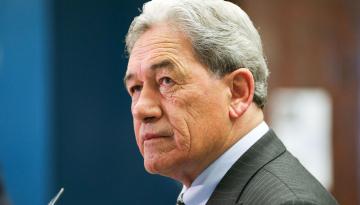Prime Minister Jacinda Ardern has spoken out against the treatment of Uighur Muslims in China, and a controversial Hong Kong security law, in a speech to the Chinese business community in New Zealand.
The Prime Minister began her speech by describing the New Zealand-China relationship as "in good shape", with trade ties in excess of $32 billion last year and a comprehensive strategic partnership now in its sixth year.
But Ardern also touched on "differences" between China and New Zealand, singling out Hong Kong's contentious new security law, the treatment of ethnic Uighurs in the Xinjiang region, and China's reluctance for Taiwan to become a member of the World Health Organization (WHO).
"Given our countries' particular histories, political and legal systems, and world views, it is natural that countries will take different perspectives on some issues," Ardern told attendees at the China Business Summit in Auckland on Monday.
"The New Zealand Government takes a stance where as representatives of the New Zealand people we think that the public has a direct and a resounding interest in the outcome," she added.
"As you know, this has come to the fore recently around developments like Hong Kong's new security law; the situation of the Uighur people in the Xinjiang province; and Taiwan's participation in the World Health Organization.
"This is important to who we are as New Zealanders."
Earlier this month, Foreign Affairs Minister Winston Peters announced that New Zealand's relationship with Hong Kong would be reviewed after China passed a security law allowing extradition to the Chinese mainland for trial.

Peters' announcement followed a high-level meeting about the situation in Hong Kong between the partners of the Five Eyes intelligence alliance, which includes New Zealand, Australia, Canada, the United Kingdom and the United States.
The new law punishes crimes of separatist activity, state subversion, terrorist activity and collusion with foreign forces, which can be punishable by up to life in prison.
The Chinese Embassy responded by telling New Zealand to "stop interfering in Hong Kong affairs and China's internal affairs, and do more to promote the sound and steady development" of the China-New Zealand relationship.
Ardern said the new security law in Hong Kong has a "direct impact" on New Zealanders.

"Looking specifically at Hong Kong, which has been in the news in recent weeks, curtailing the city's open government and judicial independence without proper involvement of Hong Kong's institutions, does directly impact on thousands of New Zealanders living in, or with close ties to Hong Kong," she said.
"Many New Zealanders have also invested in Hong Kong or do business there because of its independent judiciary or its high degree of autonomy.
"It's our view, therefore, that it's quite natural for us to raise concern about Hong Kong's security laws. We believe we are representing real, actual issues for New Zealanders who live there or operate there."
The Prime Minister did not comment further on the treatment of Uighur Muslims in China's Xinjiang region or on New Zealand's support for Taiwan joining the WHO - but they are issues Ardern or Peters have spoken about before.
Ahead of her trip to meet Chinese President Xi Jinping in April 2019, Ardern was urged by Human Rights Watch to condemn the "re-education camps" in China's northwest Xinjiang region where an estimated two million Muslims have been indefinitely detained.
Ardern said after her meetings in Beijing that she "raised the issue [of human rights] directly" with President Xi Jinping and Premier Li Keqiang in Beijing.
"You can't do much more than that."

Then there's the Taiwan dispute. Taiwan, officially known as the Republic of China, is considered by China as an extension of its territory. As well as being excluded from the WHO, Taiwan is also not a member of the United Nations.
China condemned New Zealand in May for violating the "one China" policy after Peters made "wrong statements" regarding Taiwan's exclusion from the WHO, after he expressed his "personal" support for Taiwan becoming a member.
The Chinese Embassy in New Zealand issued a statement urging the Government to respect the "one-China principle". It said a province of China, Taiwan is "not eligible" for the membership of the WHO.
Peters responded by telling the Chinese Ambassador to New Zealand Wu Xi to "listen to her master, Wang Yi, back in Beijing" who he said had given him assurances "China does not behave that way".



